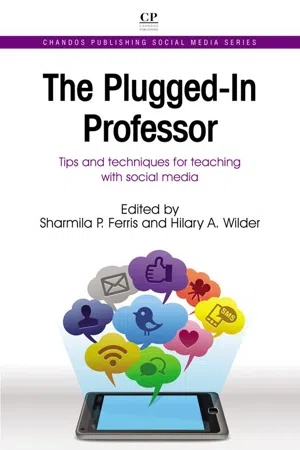
The Plugged-In Professor
Tips and Techniques for Teaching with Social Media
- 376 pages
- English
- ePUB (mobile friendly)
- Available on iOS & Android
The Plugged-In Professor
Tips and Techniques for Teaching with Social Media
About This Book
New technologies are transforming the way students work. The Plugged in Professor provides a timely and exceptional resource for using social media and other new technologies to help college students meet both general and discipline-specific objectives. The title covers techniques built around well-known social networking technologies, as well as other emerging technologies such as mobile phone and tablet apps. With a practical focus and reader-friendly format, this book shows educators how to apply techniques in each technology, and includes clear student learning objectives, step-by-step directions, observations and advice, and supplemental readings and resources. Twenty-five chapters by leading contributors cover key aspects of new technologies in education, in four parts: Writing, research and information fluency; Communication and collaboration; Critical thinking and creativity; and Integrative learning.
- Provides a cutting-edge resource for academics and practitioners in effective ways of reaching today's students through the use of their favourite tool, social media
- Outlines a range of strategies taking advantage of the unique learning styles and habits of net generation learners
- Exposes students to ways in which these technologies can be used in their professional and personal lives
Frequently asked questions
Information
Writing for Wikipedia: co-constructing knowledge and writing for a public audience
Abstract:
Discipline/Academic areas addressed
Instructional purpose
Student learning outcomes
Prerequisite skills and knowledge
Prerequisite skills and knowledge for students
Recommended prerequisites for instructors
Step-by-step directions
Decide on how to incorporate a Wikipedia project into your course
Table of contents
- Cover image
- Title page
- Table of Contents
- Copyright
- List of tables and figure
- List of abbreviations
- Acknowledgments
- Preface
- About the editors
- About the contributors
- Part 1: Writing, research, and information fluency
- Part 2: Communication and collaboration
- Part 3: Critical thinking and creativity
- Part 4: Integrative learning
- Index